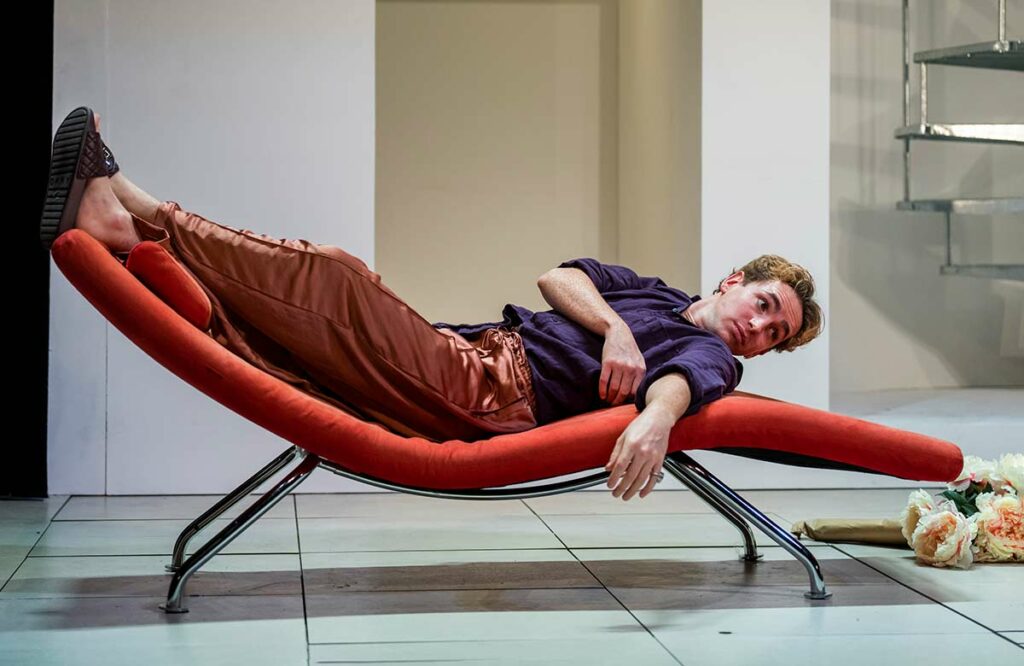
You would hope that Rory Mullarkey finds some humour from the prophetic exchange in his new play Mates in Chelsea, now playing at the Royal Court Theatre. ‘It’s not like we’re going to be winning any theatre awards anytime soon,’ proclaims Tug (Laurie Kynaston). ‘I highly doubt we’ll be nominated,’ replies Finty (Natalie Dew). That exchange comes with knowing glances to the audience from Kynaston and Dew following the somewhat scathing reviews that followed the play’s official opening last week.
I am coming to the show a week later, now that the dust has settled on the one and two-star reviews – though a glowing four-star review in the Telegraph should take the edge off slightly. How much is Mullarky’s ode to Oscar Wilde and P.G. Wodehouse worth the critical panning?
Mates in Chelsea – the play on the title of a reality TV series more than obvious – follows 30-year-old Viscount Theodore ‘Tug’ Bungay who, having spent most of the family’s coffers wining and dining on smoked salmon, prawns and caviar in Chelsea and sending expensive apology bouquets to his long-term fiancé Finty, receives the bombshell that his mother Agrippina (Fenella Woolgar) is planning to sell his beloved Northumberland castle to a Russian Oligarch to shore up the accounts for his future. Cue a farcical plan to derail the sale.
The production’s downfall is two-fold; the lack of pace at which this plays out and the lack of any character development as it happens. The opening 45 minutes feel much longer as Mullarky sets out each character and their intentions, and director Sam Pritchard allowing the action to meander along at a snail’s pace. Similarly, the second half, comprised of two acts, feels finished about 20 minutes before Mullarky and Pritchard finally allow the curtain to drop.
We might feel more forgiving if we felt like there was something to gain in the slow exposition of the characters but by the end of the play, each character is exactly as they were at the start – though their circumstances have changed, they have not. That might be Mullarky’s intention, to show that this moneyed upper class of ‘overeducated and underemployed’ can’t and won’t change but without some kind of foil, characters who do develop, for this to play out against it makes it all seem a little pointless.
And it might have seemed less so if the play was unashamedly entertaining, but though there are laughs here they are too few – and there are too many attempts at laughs that don’t work. The same joke about Tug not understanding how mortgages work falls flat each of the three times it is made.
There are some saving graces though – the performances throughout the cast are outstanding, despite everything else. Kynaston is a joy to watch and you feel instantly drawn to his roguish toff, and George Fouracres is a sensation as Tug’s Charlton Thrupp who thinks of himself as ‘an adventurer cum wandering scholar cum author cum deejay cum international politics podcast host.’ Fouracres’s take on Thrupp could slot right into the best moments of Blackadder.
Meanwhile, Woolgar plays Tug’s mother with the appropriate level of detachment – a more rational and mature version of her role in the film Bright Young Things – and Amy Booth-Steel brings a dry wit to Tug’s long-suffering socialist and Soviet-supporting housekeeper Mrs Hanratty. And that’s the real shame – despite the obvious talent Mullarky has shown in other productions – there’s a tremendous cast here being fed the wrong lines.
Mates in Chelsea is at the Royal Court Theatre until 16 December.
What happened to star-ratings? Read the editorial now to find out why we’re no longer providing star-ratings for most productions.














